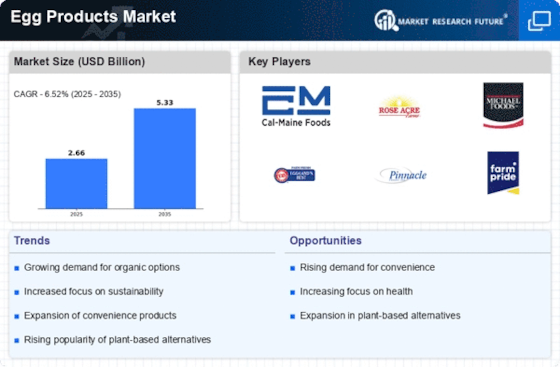Top Industry Leaders in the Egg Products Market
Strategies Adopted by Egg Products Key Players
The competitive landscape of the egg products market is characterized by a mix of global leaders and emerging players, all vying for a substantial market share in this essential food sector. Key players such as Cal-Maine Foods, Inc., Rose Acre Farms, and Michael Foods, Inc. dominate the market with their extensive production capabilities and distribution networks. These industry giants play a pivotal role in shaping market dynamics, while smaller and newer entrants strive to carve out niche segments through innovation and agility.
Key Players:
The Kraft Heinz Company (US)
Rembrandt Enterprises Inc. (US)
Tyson Foods Inc. (US)
SKM Egg Products Export (India)
Michael Foods Inc. (US)
Daiya Foods Inc. (Canada)
Andros (France)
Key players in the egg products market employ various strategies to maintain and enhance their market positions. Vertical integration is a common approach, with companies engaging in both egg production and processing to ensure control over the entire supply chain. Cal-Maine Foods, for instance, has pursued this strategy by acquiring egg production assets, allowing the company to streamline operations and optimize efficiency.
Product diversification is another key strategy, with companies expanding their portfolios to include a range of egg products beyond traditional shell eggs. Michael Foods, Inc., for example, offers a diverse array of egg-based products such as liquid eggs, pre-cooked eggs, and specialty egg blends. Such diversification enables companies to meet the evolving demands of foodservice and retail customers.
Market Share Analysis:
Market share analysis in the egg products sector is influenced by several factors. Quality and safety standards are paramount, as consumers and industry players prioritize eggs and egg products that adhere to stringent quality controls. Pricing strategies, distribution efficiency, and the ability to meet regulatory requirements also significantly impact market share. Given the perishable nature of eggs, companies with robust distribution networks and efficient logistics gain a competitive edge.
Brand reputation and consumer trust play a crucial role in market share dynamics. Companies that invest in transparent communication regarding sourcing practices, animal welfare standards, and sustainability initiatives tend to build stronger brand loyalty, translating into a larger market share.
New and Emerging Companies:
While global players dominate the egg products market, several new and emerging companies are making inroads, particularly in specialty and organic egg products. Niche players like Vital Farms have gained recognition for their commitment to ethical and sustainable egg production. These emerging companies often focus on specific market segments, appealing to consumers seeking alternatives based on factors such as organic certification, free-range practices, and humane treatment of animals.
Industry News Trends:
The egg products industry is subject to ongoing industry news and evolving investment trends. Notably, the industry has seen increased investments in technology and automation to enhance production efficiency and meet growing demand. Automation in processing plants contributes to the standardization of egg products and helps manage costs effectively.
Furthermore, sustainability has become a focal point, with companies investing in environmentally friendly practices. This includes initiatives to reduce water and energy consumption in egg production facilities, as well as exploring alternative packaging materials to minimize environmental impact.

Competitive Scenario:
The egg products market is characterized by a competitive landscape where established players with large-scale operations dominate, and emerging companies aim to differentiate themselves through specialization and innovation. The industry's resilience is evident as companies adapt to changing consumer preferences, technological advancements, and sustainability imperatives. As the demand for egg products continues to grow, competition remains fierce, necessitating strategic foresight and adaptability for sustained success.
Recent Development:
Plant-based substitutes: Businesses are creating egg-like goods from legumes, starches, and other plant-based materials in response to the growing consumer demand for vegan and plant-based alternatives.
Organic and cage-free sourcing: In an effort to better reflect the values of their target audience, brands are starting to prioritise ethical sourcing by providing cage-free, organic, and antibiotic-free egg products.











